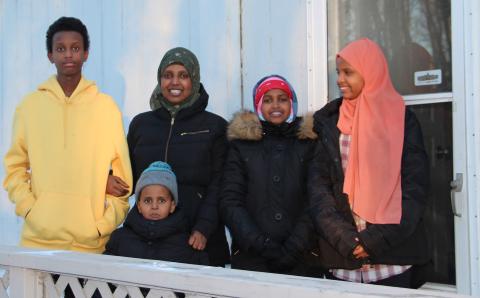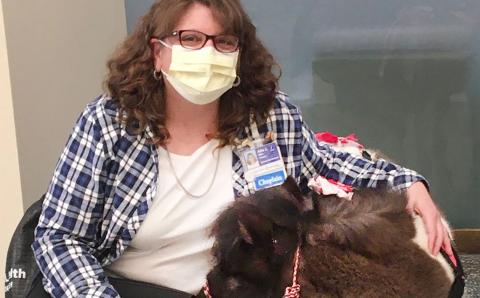“The Lord is transforming the Christian Reformed Church from its origin of a predominantly white denomination to more of a mosaic portrait of what God really intends,” said Reggie Smith, the CRCNA’s director of diversity.
In fact, one of the denomination’s Our Journey 2025 ministry priorities is to “grow in diversity and unity by seeking justice, reconciliation, and welcome, sharing our faith as we build relationships with and honor the cultures of our neighbors and newcomers.”
Today, as people move throughout the world and various cultures collide, the denomination has an opportunity to worship God and seek God’s shalom together as a diverse family of Christ. But that work is sometimes easier to talk about than to do. It takes intentionality.
Here’s a glimpse of how some CRCNA congregations and agencies are working toward that vision:
Welcoming Refugees
“Diversity has taken on all kinds of meanings,” Smith said. “I’m defining diversity in terms of people groups and nations and the biblical theme of God’s kingdom. God’s kingdom is big; it’s wide; it’s vast; it’s spacious.”
One of the ways the CRCNA is growing is by welcoming people from different countries, including through refugee sponsorship. World Renew, the Centre for Public Dialogue, and the Office of Social Justice work to provide better support and a better welcome for refugees moving to Canada and the United States. Several CRC congregations are involved in this ministry too, and some, such as New Life in Guelph, Ont., even serve as sponsors for refugee families.
New Life has been sponsoring refugees for more than 20 years. They consider it a long-term commitment. Currently, the congregation has three active applications for sponsorship underway with the Canadian government—but that doesn’t mean the process is smooth sailing. In one case, they’ve been waiting for two years for an application to be reviewed and approved.
“It is not clear when that processing will occur,” said Gary VanArragon, a member of New Life’s refugee sponsorship team.
The most recent family that New Life sponsored arrived from Somalia via Yemen and Turkey. The family arrived during the COVID-19 pandemic, and the church jumped into action to work within the current health and safety guidelines.
“When the family arrived,” VanArragon said, “we were required to provide transportation from the airport in sanitized vehicles that were large enough to allow for appropriate distancing.”
The church also worked to provide temporary housing and supplies for the two-week isolation period required for those entering the country during the COVID-19 pandemic. Refugees such as this family from Somalia have experienced trauma and hardship. They often arrive with few belongings and resources. This requires sponsors to work hard and be flexible, but as CRC congregations welcome and support such newcomers, they have the opportunity to be examples of Christ to those who need to experience his love and peace.
Growing Through Church Plants
One of the fastest ways the CRCNA is growing, both in numbers and in diversity, is through ethnic minority church plants. Resonate Global Mission partners with more than 15 ethnic minority church plants and more than 10 multiethnic church plants in the U.S. and Canada.
Ethnic minority church plants are uniquely equipped to provide meaningful faith communities for people to worship and learn about God in their own culture and language.
“The most important thing is a sense of belonging,” said Eric Sarwar, pastor of Artesia City Church in Artesia, Calif. “When you are an immigrant, you don’t know the language. You don’t know the system. You don’t know who is going to help you or not.”
Artesia City Church is a faith community of first- and second-generation immigrants from India and Pakistan. Moving to a new country can be isolating, and India and Pakistan both have cultures that are more community-focused than the individualistic cultures in Canada and the U.S. Sarwar planted the church after moving to the U.S. from Pakistan and struggling to find a church where he could worship in his own language and culture.
Artesia City Church has grown rapidly. Sarwar and a few people originally started meeting for worship in a home. Within three months, the house was crowded, and Trinity CRC offered space in its building so the church plant could meet and welcome more people.
One member is a young man who moved alone from India. He didn’t know anyone in his new community and was, among other challenges, struggling with the immigration process. But then he learned about Artesia City Church. Not only was this man able to worship God in his own language and culture, but he found a spiritual family.
“Living in a foreign land, when you are away from your biological or blood relatives, you find your spiritual bonding with the church,” said Sarwar. “You find family who speak your language, share in your culture, (and) know the challenges you face.”
Artesia City Church is just one example. In Wyoming, Mich., another church plant is providing a faith community for the growing population of Spanish-speaking people from throughout Latin America. Comunidad Cristiana Internacional (International Christian Community) was planted by Robert Garcia with support from Resonate, Classis Grand Rapids South, and Community Christian Reformed Church.
“We are working together in a single vision to reach the Hispanic community,” said Garcia, who is from Venezuela. The church plant has welcomed individuals and families from the Dominican Republic, Puerto Rico, Guatemala, Argentina, Mexico, and other countries. Many people who connect with Comunidad Cristiana Internacional are not originally Christians, but through the church plant, they’re able to learn about God in their own language. Several people have accepted Christ and are continuing to grow in their faith.
Planting and supporting church plants for communities of all cultures and ethnicities in Canada and the U.S. require support from across the denomination. It also provides the entire denomination with new opportunities to listen and learn from other Christians.
Growing in Unity
As people from throughout the world are finding a home in the CRCNA, working to better understand immigration policies and procedures is one way the denomination is striving to better welcome and support people from all cultures and countries.
“There’s a lot of misinformation floating around about our immigration system (in the U.S.),” said Kendra Utter David, the Office of Social Justice’s immigration and justice specialist. That’s why many Christian Reformed churches and community members are participating in the OSJ’s Church Between Borders workshop.
Churches, colleges, universities, and other ministries in the U.S. are developing their understanding of how the immigration system works through the interactive three-part workshop. Yolanda Vega, senior academic and career adviser at Hope College, regularly offers the experience to her students.
“In a day and age where immigrants are often vilified in the media, it was important to me that the students have accurate information and an understanding of the realities surrounding legal immigration,” Vega said.
The workshop has been helping students better understand the challenges immigrants face. After a recent Zoom meeting, Vega asked students to reflect on what they had learned. Most of them knew little to nothing about the process or pathways of legal entry to the U.S.
“They didn’t know about the parameters limiting each pathway, nor did they realize how difficult and complicated the system is,” Vega said.
That’s one of the most common pieces of feedback the OSJ hears from churches, schools, and other ministries who have participated in Churches Between Borders.
“As Christians called to love our neighbors,” Utter David said, “it’s important to back up and look at how the immigration system really works so that we can work toward immigration justice.”
Resources to Help
This is just a glimpse of how the CRCNA’s churches and ministries are growing into the vision of God’s kingdom in Revelation 7:9—“a great multitude ... from every nation, tribe, people, and language.”
“It’s important to be hospitable to the new thing that God is up to,” Smith said. “It has to do with how we share power, how we share resources, how we share decision-making, how we share the gospel. Unity doesn’t mean assimilation ... (and it) doesn’t mean uniformity. It means that we all bring gifts to the table. We all have a small slice of what God’s kingdom is.”
The ministries of the CRCNA have many resources available to assist you in your journey to grow in unity and diversity. Learn more at crcna.org/OurJourney.
About the Authors
Cassie Westrate, Resonate Global Mission
Victoria Veenstra






